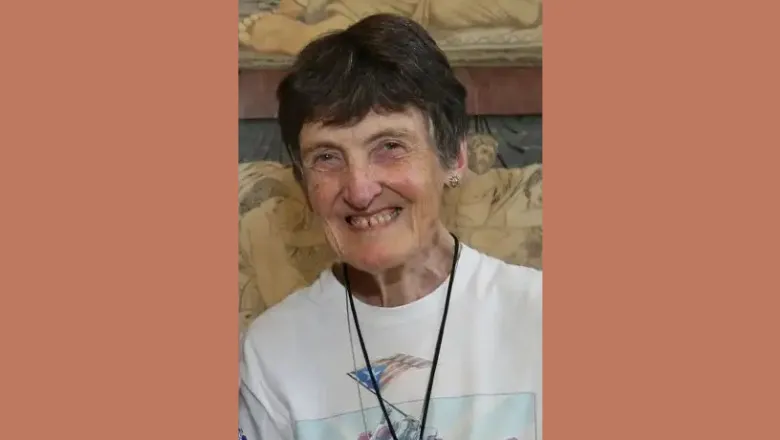Tribute to Professor Dame Janet (Jinty) Nelson

Jinty, as she was known, was a distinguished medieval history scholar of international standing as well as an inspirational colleague and teacher. Her life and career will be celebrated by her colleagues in the Department of History – see their tribute here – where she spent almost her entire academic career from 1970 until her retirement in 2007, and very widely elsewhere. It is highly appropriate, however, to add our own tribute from the field of Digital Humanities – previously ‘humanities computing’, which was its description for most of Jinty’s time at King’s.
We remember Jinty for many things, starting with her unwavering support for what we were doing, going back to 1989 when she collaborated with Susan Kruse to set up and co-teach a non-credit ‘History and Computing’ course for second year History students. It was remarkable and far from common that such a well-established scholar would take such a keen interest in the possibilities offered by this relatively new area of activity.
She continued to take a strong interest as we developed, first as the Research Unit in Humanities Computing (1992), and then as the Centre for Computing in the Humanities (CCH) in 1996. She was a passionate advocate for CCH’s acceptance into the School of Humanities as an academic department in 2002. (CCH changed its name to Department of Digital Humanities in 2012.) She was very supportive of those in the History Department and beyond who were interested in collaboration with CCH – and there were also cases where she took the initiative and urged colleagues in our direction when she thought this would make for a more successful project!
Jinty was a key figure in one of the early flagship collaborations between History and CCH, the Prosopography of Anglo-Saxon England project , the first phase funded by the Arts and Humanities Research Board in 2000. This resource is now hosted at the University of Oxford under the oversight of Stephen Baxter – the Principal Investigator in the later phases of the project – and remains very widely in use.
She had been in discussion with CCH colleagues for a while about such a project but hesitated to lead research that she did not feel was in her primary area of expertise. This concern was overcome when the distinguished Anglo-Saxon scholar Simon Keynes from Cambridge agreed to be Co-Investigator with her. This should be seen as an example of Jinty’s unwavering commitment to the highest standards of scholarship – ‘copper-bottomed scholarship’ to use a favourite phrase – which informed her own research as well as her teaching and supervision. Projects in which she was involved – PASE and others – benefited enormously from this uncompromising approach.
At the same time, Jinty was a generous and meticulous collaborator. She said more than once that she gained more intellectual reward from collaborative and inter-disciplinary research than from working on her own. She was certainly a constant source of wise and sympathetic advice in her projects with CCH, always ready to offer praise for what was achieved, and constructive in the search for remedies in the face of the many challenges that inevitably arise during large complex projects. It was a measure of her generosity of spirit that she treated all her colleagues and collaborators, from the most junior to the most senior, whether researchers from History or technical specialists from CCH, with the same warm empathy and respect. Indeed she was particularly known for her encouragement of younger scholars – as attested by a number of social media posts in the days following her death.
After PASE, which received two tranches of funding during the time of Jinty’s direct involvement, the next major project in which she was Principal Investigator was The Language of Landscape, funded by the Arts and Humanities Research Council in 2005. Among several others was a project on Anglo-Saxon Charters funded by the British Academy, also in 2005; while exploratory in nature, it was innovative at the time with respect to interconnected data and layers of analysis. Her last major collaboration with DDH was The Making of Charlemagne’s Europe, with her History colleague Alice Rio as Principal Investigator. This project was funded by the Arts and Humanities Research Council in 2012, so well after Jinty’s ‘retirement’. All three projects are hosted by the King’s Digital Lab.
All Digital Humanities projects are highly collaborative. Jinty’s collaborative spirit and intellectual rigour ensured that project proposals in which she was involved were guaranteed to be of the highest quality, and this, along with their vision and originality, clearly impressed the panels judging them.
From all our joint projects, and many other types of collaboration over the years, there are a great many colleagues in the Dept of Digital Humanities and King’s Digital Lab, as well as in other departments and in partner institutions, who have reason to celebrate Jinty and who have many, many reasons to remember her with the greatest admiration and affection.
(with thanks to many colleagues and friends of Jinty, including Stephen Baxter, John Bradley, David Carpenter, Arianna Ciula, Trudi Darby , Vanessa Davies, Stuart Dunn, Mark Hedges, Barry Ife, Susan Kruse, Paul Spence, Peter Stokes, Francesca Tinti.)
